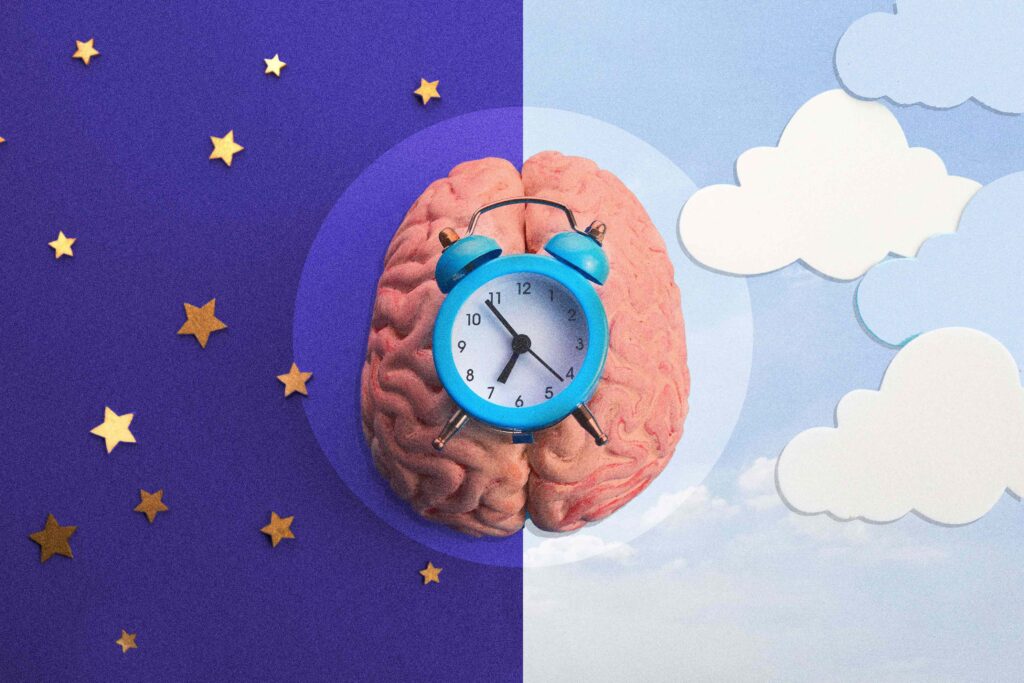Key Takeaways
- Your sleep chronotype is your body’s natural pattern of sleeping and waking.
- Knowing your sleep chronotype is key to figuring out when you’re most alert and energized, and when you should get some sleep.
- If you’re having trouble keeping in sync with your body’s internal clock, contact a sleep specialist or your healthcare provider.
Are you the type of person who’s bright-eyed and bushy-tailed early in the morning, or do you hit your stride just as everyone else is winding down for bed?
Our sleep-wake habits aren’t random—they’re tied to something called a chronotype. Your sleep chronotype is your body’s natural pattern of sleeping and waking, says Aimee Daramus, PsyD, a clinical psychologist at Clarity Clinic, Chicago.
“Some people are ‘morning types,’ often called early birds, who thrive in the early hours. Others are ‘evening types,’ or night owls, who feel most alert later in the day and prefer staying up late. Most of us fall somewhere in between,” says Sita Kedia, MD, MPH, FAHS, IFMCP, a neurologist and Chief Medical Officer at PALM Health.
The Sleep Chronotype Quiz
Take this quiz to figure out your sleep chronotype, so you can be more in sync with your body clock.
This quiz is not meant to be a professional assessment or diagnostic tool. If you need help with something that this quiz cannot capture, please reach out to a healthcare provider for support.
Who Is This Quiz For?
This quiz is for anyone who wants to understand their natural sleep-wake rhythm a little better. Whether you’re an early riser, a night owl, or somewhere in the middle, your sleep chronotype influences when you feel most alert, energized, and productive.
If you’ve been struggling to wake up in the morning, feeling restless at night, or just generally feeling like your current schedule doesn’t align with your internal clock, identifying your sleep chronotype can help you adjust your daily routine so it works with your rhythm instead of against it.
When you know your chronotype, you can align your day with the times your brain and body naturally perform best, boosting energy, focus, and mood, says Dr. Kedia. “This knowledge can also guide choices around sleep hygiene, lifestyle, and even when choosing a career, since some schedules work better for certain chronotypes.”
The Importance of Aligning Your Schedule With Your Chronotype
Aligning your day with your sleep chronotype matters because it helps you work with your body’s natural rhythm instead of constantly fighting against it. Here’s how it can make a difference:
- Boosts productivity: Each chronotype has a different peak energy time. By scheduling your most demanding tasks—whether at work, school, or home—during these peak hours, you can maximize your productivity. Trying to get something done when you’re low on energy and focus can be a struggle.
- Reduces fatigue: Your brain works best when you’re aligned with your body’s internal clock. Otherwise, you’ll feel like you’re constantly battling against your own body, which can be exhausting. This can lead to fatigue, low productivity, trouble concentrating, and irritability, says Dr. Kedia.
- Improves sleep quality: Fighting your chronotype by staying up too late or waking up too early can affect your sleep quality. Aligning your sleep and wake times with your body’s natural rhythm can help you fall asleep faster, stay asleep longer, and wake up feeling more refreshed and rested.
- Optimizes health: In addition to energy and focus, your sleep chronotype can also influence factors like your appetite, hormones, and core body temperature, says Dr. Daramus. In the long run, being out of sync with your sleep chronotype can affect your health and increase your risk for conditions like obesity, diabetes, depression, and cardiovascular disease, Dr. Kedia explains.
Verywell Mind uses only high-quality sources, including peer-reviewed studies, to support the facts within our articles. Read our editorial process to learn more about how we fact-check and keep our content accurate, reliable, and trustworthy.
-
Kalmbach DA, Schneider LD, Cheung J, Bertrand SJ, Kariharan T, Pack AI, Gehrman PR. Genetic basis of chronotype in humans: Insights from three landmark GWAS. Sleep. 2017 Feb 1;40(2):zsw048. doi:10.1093/sleep/zsw048
-
von Gall C, Holub L, Pfeffer M, Eickhoff S. Chronotype-dependent sleep loss is associated with a lower amplitude in circadian rhythm and a higher fragmentation of REM sleep in young healthy adults. Brain Sci. 2023 Oct 19;13(10):1482. doi:10.3390/brainsci13101482
-
Montaruli A, Castelli L, Mulè A, Scurati R, Esposito F, Galasso L, Roveda E. Biological rhythm and chronotype: new perspectives in health. Biomolecules. 2021 Mar 24;11(4):487. doi:10.3390/biom11040487
Thanks for your feedback!
What is your feedback?
Helpful
Report an Error
Other

